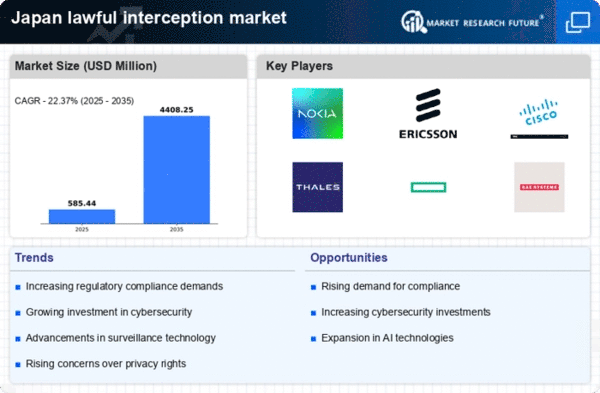Legal Framework Enhancements
Japan's legal framework surrounding data privacy and surveillance is undergoing significant revisions to adapt to the changing technological landscape. Recent legislative changes aim to balance individual privacy rights with the need for effective law enforcement. These developments are likely to impact the lawful interception market, as service providers must align their technologies with new legal requirements. The lawful interception market may see increased demand for solutions that facilitate compliance with these evolving regulations. As legal frameworks become more stringent, organizations will need to invest in advanced interception technologies to ensure adherence while maintaining operational efficiency.
Public Awareness and Advocacy
There is a growing public awareness regarding privacy rights and the implications of surveillance in Japan. Advocacy groups are increasingly vocal about the need for transparency in lawful interception practices. This heightened awareness may influence the lawful interception market, as organizations strive to balance compliance with public sentiment. Companies may be compelled to adopt more transparent interception practices and invest in technologies that ensure accountability. As public discourse around privacy continues to evolve, the lawful interception market may experience shifts in demand, with a potential focus on solutions that prioritize ethical considerations alongside legal compliance.
Rising Cybersecurity Concerns
As cyber threats continue to evolve, Japan faces increasing challenges in safeguarding its digital infrastructure. The rise in cybercrime has prompted both public and private sectors to invest heavily in cybersecurity measures, which includes lawful interception capabilities. Reports indicate that cyber incidents in Japan have surged by over 20% in the past year, highlighting the urgent need for effective monitoring solutions. Consequently, the lawful interception market is likely to benefit from this heightened focus on cybersecurity, as organizations seek to integrate interception technologies to detect and prevent potential breaches. This trend suggests a growing recognition of the importance of lawful interception in maintaining the integrity of communication networks.
Telecommunications Sector Expansion
Japan's telecommunications sector is experiencing significant growth, driven by advancements in mobile and internet technologies. With the increasing number of mobile subscribers and internet users, the demand for lawful interception solutions is expected to rise correspondingly. The telecommunications market in Japan is projected to reach approximately $100 billion by 2026, indicating a robust expansion. This growth presents opportunities for the lawful interception market, as telecom operators are required to comply with regulations mandating the implementation of interception capabilities. As the sector evolves, the integration of lawful interception technologies will become essential for service providers to meet legal obligations and ensure secure communications.
Increased Government Surveillance Initiatives
The Japanese government has been intensifying its surveillance initiatives to enhance national security and public safety. This trend is likely to drive the lawful interception market as authorities seek advanced technologies to monitor communications effectively. In recent years, the government has allocated substantial budgets for security enhancements, with estimates suggesting an increase of approximately 15% in funding for surveillance technologies. This growing emphasis on security is expected to propel demand for lawful interception solutions, as law enforcement agencies require sophisticated tools to intercept and analyze data. The lawful interception market is thus poised for growth, as the government prioritizes the implementation of robust surveillance frameworks to address emerging threats.
















